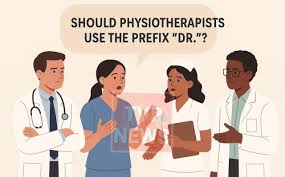A short but highly charged directive from India’s top health regulator has reignited an old debate: who, exactly, gets to be called “doctor”?
Earlier this month, the Directorate General of Health Services (DGHS) issued an order barring physiotherapists from using the “Dr.” prefix, warning that the practice misleads patients into assuming they are consulting medical doctors. The directive cited the century-old Indian Medical Degrees Act, which restricts the use of medical titles to those with recognized degrees in allopathic medicine.
Within twenty-four hours, however, the order was hastily withdrawn. Officials admitted the issue required further study, leaving tens of thousands of practicing physiotherapists in limbo — and highlighting broader questions about professional identity, patient safety, and the evolving scope of allied healthcare in India.
A Law That Leaves Gray Areas
The dispute centers on the National Commission for Allied and Healthcare Professions (NCAHP) Act, 2021. That law formally recognized physiotherapists as part of India’s allied health workforce and, in certain documents, permitted them to use the prefix “Dr.” with the suffix “PT” (for physiotherapy). Physiotherapists argue this format distinguishes them from physicians while signaling advanced training.
The Indian Medical Association (IMA), however, strongly opposes the practice. Its leaders insist that the “Dr.” prefix is inseparable from medical degrees and that any relaxation will cause “irreparable confusion” among patients seeking treatment.
Voices From the Profession
Physiotherapists counter that their five-year programs, rigorous licensing exams, and clinical work justify the title. “We do not claim to be MBBS doctors,” said one senior physiotherapy educator. “But denying us the title undermines our role, when our interventions are essential for rehabilitation, mobility, and chronic disease management.”
The DGHS order — and its swift retraction — has further muddied the waters. For now, state licensing bodies continue to interpret the rules differently, leaving patients confronted with inconsistent designations and healthcare workers anxious about penalties.
What Lies Ahead
The controversy reflects broader tensions in India’s rapidly diversifying healthcare landscape. As the burden of non-communicable diseases grows and demand for rehabilitation rises, allied health professionals are seeking greater recognition. Regulators, meanwhile, are caught between protecting patients from misrepresentation and acknowledging the contribution of non-physician specialists.
A high-level meeting at the Health Ministry is expected to revisit the issue in the coming weeks. Until then, the title “Dr.” remains a flashpoint — a matter of pride, legality, and public trust, all tangled together in India’s complex medical system.


